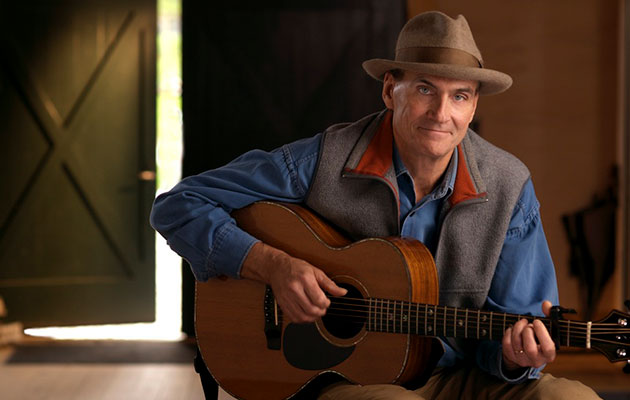Originally published in Uncut’s July 2015 issue (Take 218)
Reflecting on the process of making an album, James Taylor feels he has at last hit his stride. “It’s something I’ve done 16 times, so I feel like I know how to go about it now.” Uncut meets Taylor in the suite of a west London hotel where, over morning coffee, the singer-songwriter cheerfully talks through the many highlights of his back catalogue, as well as his latest album, Before This World. Along the way, Taylor’s marvellous tales include cameos from two Beatles, Joni Mitchell, Carole King and other high achievers; a testament to the esteem in which Taylor is held by his peers. But despite his remarkable success – he has 10 platinum albums to his credit – there is also darkness in Taylor’s life. “My personal story is recovery from addiction,” he acknowledges. “That’s Why I’m Here,” he explains when asked to choose a landmark from his own albums. “That’s special to me, because it was like a rebirth.”
Like us on Facebook to keep up to date with the latest news from Uncut
___________________________
James Taylor
Apple, 1969
The young songwriter gets a little help from his friends, Paul McCartney and George Harrison, and records this ornate, orchestrated debut in London.
I was staying with a friend in London, and my new friends there heard my music and encouraged me to record a demo – a little 20-minute reel-to-reel and acetate that I cut in a demo studio, a little two-track studio with a name which I cannot remember. My friend Judy Steele was going to play the demo for anyone who would listen at the BBC. In the meantime, I got in touch with Peter Asher and, as luck would have it, he was newly signed on as head of A&R with The Beatles’ new Apple label. He liked my demo, got me an audition with George and Paul. The Beatles’ offices were in Baker Street then, and I auditioned there. Paul recalls my playing with him and George in a small room. They asked Peter if he would like to produce me, and he said, ‘Yeah.’ They were recording the ‘White Album’ at Trident, as Abbey Road did not have a working eight-track machine, and I used the time between their sessions to record my own album. And we are still good and dear friends. Although, in my opinion, the first album was a little over-produced, to have been acknowledged by and green-lighted by The Beatles was for me like a dream. That was like something that would happen in a sort of daydream. It was just totally improbable and impossibly good.
___________________________
Sweet Baby James
Warner Bros, 1970
A critical and commercial success, Taylor’s second cemented his position as one of the most popular singer-songwriters of the early ’70s.
http://www.youtube.com/watch?v=7ALnh3w32VE
This was the thing which broke me. It was a delightful surprise. After my first album, Allen Klein took over The Beatles’ Apple company. Klein wasn’t interested in anybody else on the label – that meant Mary Hopkins, James Taylor, Jackie Lomax, Badfinger, Billy Preston. He only wanted The Beatles, so when Peter Asher requested an audit of our sales, which was quite reasonable to do, Klein dropped us. I sort of limped back to America to lick my wounds and recover from a heroin habit and go through opium withdrawal – something that I did a number of times in the following years. Peter Asher called me up in rehab in the States and said, “Let’s go to Los Angeles, I think I can get you a record deal at Warner Bros.” So that’s what happened, he moved to LA, he took various jobs for a while just to keep body and soul together. I got the deal and we went to Sunset Sound and cut Sweet Baby James on 16-track, with a small band, Carole King on piano, myself, Danny Kortchmar on guitar, Russ Kunkel on drums and Leland Sklar on bass. That was my core band for a while. The success was a surprise, “Fire And Rain” was a No 1 single, and so we were all off and running. I really like Sweet Baby James – the songs came fast, it came all of a piece. Usually I had written two-thirds of an album before we went into the studio, but this was different. I had broken both hands and both feet in a motorcycle accident and it sort of forced me to wait and then go into the studio when I was more than enough prepared, so the album was recorded really quickly – we cut two or three things a day and they would be largely finished after the basic tracks. So I have always liked that album, I think that it had some really great songs on it too. What does the title of “Suite For 20 G” refer to? Well, we were gonna get paid $20,000 on delivery of the album! Out of which $8,000 was the cost of recording the record.



